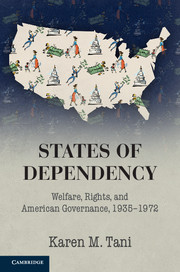Book contents
- Frontmatter
- Dedication
- Contents
- List of figures and tables
- List of gallery images
- Acknowledgments
- Introduction
- PART I 1935 TO 1949
- PART II 1950 TO 1972
- 5 States’ Rights against Federal Administrative Enforcement: Contesting Dependency
- 6 Rights against the State(s): Questioning Rehabilitation, Resisting Restriction
- 7 Welfare Rights outside the Courts: The Administrative Origins of Poverty Law
- 8 Subjects of the Constitution, Slaves to Statutes: The Judicial Articulation of Welfare Rights
- Conclusion
- Notes
- Selected Bibliography of Primary Sources
- Index
- Plate section
6 - Rights against the State(s): Questioning Rehabilitation, Resisting Restriction
from PART II - 1950 TO 1972
Published online by Cambridge University Press: 05 April 2016
- Frontmatter
- Dedication
- Contents
- List of figures and tables
- List of gallery images
- Acknowledgments
- Introduction
- PART I 1935 TO 1949
- PART II 1950 TO 1972
- 5 States’ Rights against Federal Administrative Enforcement: Contesting Dependency
- 6 Rights against the State(s): Questioning Rehabilitation, Resisting Restriction
- 7 Welfare Rights outside the Courts: The Administrative Origins of Poverty Law
- 8 Subjects of the Constitution, Slaves to Statutes: The Judicial Articulation of Welfare Rights
- Conclusion
- Notes
- Selected Bibliography of Primary Sources
- Index
- Plate section
Summary
On June 27, 1954, Andrew Wade IV and his wife, Charlotte, returned from an evening out just in time to see an explosion rip through a large section of their new house. The Wades were shaken but not entirely surprised. They were the first black family to move into an all-white neighborhood on the outskirts of Louisville, Kentucky, and they had done so at a particularly inauspicious time: on May 17, within days of their move, the Supreme Court had issued its controversial decision in Brown v. Board of Education. A barrage of threats and harassment followed for the Wades, beginning with shattered windows and culminating in the bombing – a depressingly familiar pattern to black Americans who challenged the color line. More unusual, in the Wades’ case, was the criminal proceeding that followed, in which a local prosecutor rejected the possibility of segregationist terrorism and instead pointed the finger at local civil rights activists: they planted the bomb, the prosecutor alleged, as part of a communist-inspired plot to fuel racial tension.
On the surface the story had little to do with public welfare, and yet federal welfare officials were following it closely. Two lesser-known defendants in the ensuing sedition prosecution had caught their eye: Mary Louise Gilbert, a Louisville social worker, and her roommate, Larue Spiker, described in the press as “an unemployed factory worker.” Prior to the bombing, under the auspices of the Women's International League for Peace and Freedom, both women had sent letters to the Wades’ new neighbors urging tolerance – which in 1954 Louisville was enough to place them under a cloud of suspicion. Four years earlier and 114 miles north, in Indianapolis, federal administrators remembered, these very same women had fallen under a similar cloud – and had ultimately helped spark a national controversy over federal-state welfare administration. That this remote connection merited attention from high-level federal agency officials speaks to the importance of what happened in Indiana in the early 1950s, when conservative Republicans, flanked by southern Democrats, encouraged Indiana officials to defy the federal welfare agency and risk the state's multimillion-dollar federal grant, a game of chicken that ended with Congress nullifying the offending provision of the federal law (the Social Security Act's confidentiality requirement). It also gives a sense of the climate surrounding New Deal public assistance programs in the mid-1950s.
- Type
- Chapter
- Information
- States of DependencyWelfare, Rights, and American Governance, 1935–1972, pp. 189 - 211Publisher: Cambridge University PressPrint publication year: 2016



